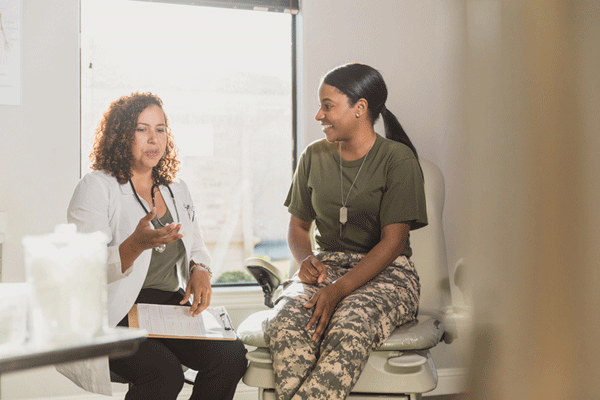After over a decade of service in the U.S. Coast Guard, Kerry Karwan tried to get pregnant at age 38. But she was diagnosed with polycystic ovarian syndrome (PCOS) and needed infertility treatments to have a baby. In vitro fertilization (IVF) is not covered for active duty servicewomen unless they have lost reproductive abilities due to service-related injuries, so Karwan paid out of pocket for treatments and used personal leave days when possible.
“The military did not support my issues with infertility and my family-building goals. IVF is considered an ‘elective’ procedure, even though my health condition of PCOS is not an ‘elective’ medical condition,” Karwan said.
Military life conflicted with Karwan’s treatments. “The week of my retrieval, my CO told me to reschedule it like it was a dental cleaning, not an egg retrieval that I had been prepping for for over three months. I was deployed during my treatments and was giving myself timed shots in a rental car because there was nowhere else sanitary to do it,” she said.
Then, Karwan had to move from California to Virginia under military orders and two of her embryos were damaged in shipment. “In my mind, two of my children were killed and nobody cared. It’s an issue that someone who isn’t being moved around would not have to deal with.”
When she retired from the military at age 42, her IVF treatments had not been successful. However, the Veterans Administration (VA) determined Karwan’s infertility was service-related and finally offered to cover her infertility care, after 10 months of paperwork to see a fertility specialist.
Her infertility struggle involved 12 IVF treatments in five different states at seven different clinics over the course of eight years. But it ended successfully, with a daughter born in July 2021.
What causes infertility in servicewomen?
Karwan’s journey to motherhood was painful — and she’s not alone. In one study of infertility among servicewomen, 37% of active duty respondents reported having trouble getting pregnant when trying to conceive. The reasons for infertility in servicewomen and service members with female biology can be both environmental and circumstantial.
One study of infertility in the Armed Forces suggested that servicewomen may have a greater risk of infertility because of trauma and stress experienced during deployment, as well as exposure to environmental toxins. Servicewomen also have higher levels of tobacco and alcohol use and sexually transmitted infections than civilian women, which are factors that can contribute to infertility.
According to Maureen Farrell, M.D., an OB-GYN who spent 22 years in active duty in the Navy, “A bigger factor contributing to infertility in servicewomen is the lack of proximity to their partner during deployment cycles, TAD (Temporary Additional Duty assignments), trainings, standing duty or watch. We don’t always consider that in the medical sense of infertility.”
While civilians may take sick days or ask for workplace accommodations during infertility treatments, service members hesitate to speak up because, according to Farrell, “any accommodations made for women can have an impact on servicewomen in their careers.”
Infertility treatment options for servicewomen
Many women and people with female biology join the military before their first Pap test or visit to a gynecologist, so servicewomen need to be educated about health concerns affecting female anatomy and reproduction.
According to Farrell, the military covers women’s health to some degree. So some young service members will have better access to healthcare in the military than they did in their childhood, which offers improved possibilities to identify infertility issues.
Fertility evaluations are covered by TRICARE, but infertility treatments are not. Active duty service members can get evaluations at Military Treatment Facilities (MTFs), but will be referred to a reproductive endocrinologist (fertility specialist) for treatment off-base. However, out-of-pocket expenses are so high that such treatments are out of reach for many patients.
Farrell noted that the only way for fertility treatments to be covered while service members are in active duty is if they are able to see an active duty reproductive endocrinologist at a military treatment facility. There are active duty endocrinologists at larger military training centers, such as San Diego, San Antonio or Washington, D.C. So, those duty stations are the most affordable locations for infertility treatments, but they are not accessible for many.
“We are really lacking because we are referring servicewomen to outside specialists that may not exist in their area, and may be cost-prohibitive,” Farrell said.
Challenges servicewomen face when addressing infertility
Servicewomen and service members with female biology need access to healthcare experts to understand their fertility options at a young age. But, as the number of women joining the military has grown, the number of women’s healthcare experts available — particularly during deployments — has not increased at the same pace.
“The military health system is trying to streamline health services for the warfighting mission,” Farrell said. “Obstetrics aren’t essential to deployment scenarios, so … gynecologists are not present in deployed settings — even though women are deployed.”
This is a problem because other branches of medicine are not trained in women’s health services. With few women’s healthcare experts in the field and a stigma associated with leaving a post for women’s health appointments, the Defense Health Agency has determined that enlisted servicewomen are less likely to address their women’s health issues when they are deployed.
Farrell believes this is because lower-ranking women need to ask permission from more people in the chain of command than an officer does when making medical appointments.
Common gynecological conditions among servicewomen
Four common gynecological conditions impacting fertility in servicewomen are heavy menstrual bleeding (menorrhagia), uterine fibroids, endometriosis and polycystic ovary syndrome (PCOS). These conditions should be discussed with a doctor because if they are left untreated or are misdiagnosed, they can lead to infertility. In a recent study, the Navy discovered that servicewomen often delay medical treatments and screenings because of relocations, deployments and other unpredictable events in military schedules. When servicewomen do not report their symptoms from these conditions or seek care for gynecological infections in a timely manner, they are at increased risk of infertility.
Farrell said servicewomen and service members with female biology who are struggling with infertility have unique challenges to overcome. “When patients are ready to conceive and get off hormonal suppression, their cycles can be very painful and difficult. It’s the treatment and management issues that are more difficult in a military environment. There is still a stigma about servicewomen using medical issues to ‘get out of’ military responsibilities.”
Support for servicewomen with infertility
Since infertility is a physical and emotional journey, it’s important for servicewomen and service members with female biology facing infertility to receive adequate support.
In Karwan’s experience, the Coast Guard did not provide that support. “Everything about the military is counter-productive to a healthy IVF treatment. For an IVF treatment, you need adequate sleep, nutrients, water and minimal stress.”
But the military may soon provide better support to its members who are facing infertility. A new Air Force and Space Force policy allows Airmen and Guardians who undergo fertility treatments to take up to 35 days off from their duty stations. A recent Army directive provides allowances for those undergoing fertility treatments: compassionate reassignments, delaying PCS moves or deployments, and foregoing weight standards during treatment.
If these measures are adopted in all military branches, this could help servicewomen and service members with female biology get the time they need to undergo infertility treatments while they are most effective. Although there is still work to be done for fertility treatment access, these new policies demonstrate that the military is taking steps to offer support to those who need fertility treatments.















